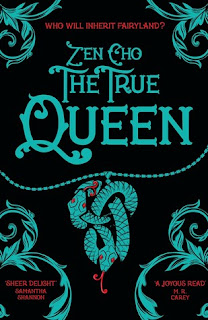5/5 stars on Goodreads
 |
| The True Queen by Zen Cho |
The True Queen is the second book in Cho’s charming Sorcerer Royal
series that began with the Sorcerer to the Crown. It’s a fantasy set in Regency
England, though the only clear reference to the period is the war with Napoleon.
Magicians are integral part of that war, but magic has been dwindling because
the Queen of Fairies has closed the border to her dominion where it stems from.
Practicing magic is only allowed to men, the background against which the
author reflects the customs and mores of the period. The first book ended with
a woman seizing the highest post available for magicians, and becoming
Sorceress Royal.
The second book is set a couple of years later, and starts
with a completely different premise. It might seem like an odd choice after a
successful first book, but it works perfectly well. Two girls wake up on a
beach somewhere in Southeast Asia—likely Malaysia, as that’s where the author
is from—with no memory of who they are other than their names, Muna and Sakti. Sakti
has magic, Muna has not. Their attempt to solve the mystery of who they are
leads to England and the Sorceress Royal, but during their trip through the
fairyland, Sakti disappears, leaving Muna no choice but to try to solve the
mystery alone.
This is Muna’s book. There are many other point of view
characters as well, but it’s her story that matters. On her arrival to England,
she is mistaken for the sister with magic, and treated accordingly. As the
society only frowns at English women using magic, she doesn’t have to hide her
skills unlike the women at Sorceress Royal’s new academy. However, as Muna has
no magic, she’s forced to fake her way through the society. She forges her way
into fairyland too, to save her sister. But somewhere along the way, she begins
to suspect that things aren’t what they seem with her and Sakti. The
revelations aren’t as huge for the reader though, as they’ve been made pretty
obvious from the beginning.
The second book doesn’t deal as much with the unfairness of
the English society to women as the first did. It concentrates on the women at
The Lady Maria Wythe Academy for the Instruction of Females in Practical
Thaumaturgy, and their friendships. Prunilla, the Sorceress Royal, is a side
character, and instead the focus is on Henrietta, her best friend. She forms a
friendship with Muna, which on her part warms to romantic love towards the end.
It’s hinted at earlier in the story, but it’s never made a clear mention of,
and Muna’s fate in the story is such, that Henrietta’s love goes unrequited.
The second book, therefore, doesn’t have a similar charming romance as the
first with Zachary and Prunilla as main characters. I missed it a little, but
the book was full without it too.
The charm of the book isn’t in romance. It’s in the language
that’s straight from Jane Austen by way of Georgette Heyer. Many have tried to
emulate the style, but few have succeeded. Here, it happens effortlessly and
beautifully. There’s nothing stuffy about it, and there are no anachronisms or
jarring wrong tones marring the delightful language. The narrative tends
towards omniscient, so even though there are dedicated point of view chapters,
the narrator often shifts to another character during the chapters. But even
that works fairly well.
In a book this good, there aren’t many flaws. My only
negative note concerns Muna and how well she settled into English society. She’s
been a servant in a paradise island, but nothing about the English society
strikes her as odd. She doesn’t associate with the servants but assumes her
role as a guest easily, she doesn’t comment on other things than the cold
weather, and she takes to wearing English dresses easily. Not even the corset
gets a mention. But it’s a minor detail and doesn’t take anything from my
enjoyment of the book. I’m definitely looking forward to reading the next book
in the series.
 |
| City of Ghosts by Victoria Schwab |
I also read City of Ghosts by Victoria Schwab, one of my
favourite authors. This is a smaller book aimed at middle grade readers about
Cassidy who can see ghosts. She travels to Edinburgh with her family and ghost
friend Jacob, and discovers that an old town has much more ghosts than her
small town. And not all of them are benign.
The book started a bit slowly and I’m not sure it can keep the
interest of a pre-teen reader well. Even I struggled to continue. But once the
story gets properly under way, there’s action to the end. It was well written
and spooky enough for an easily-scared adult. There’s a TV series being
prepared based on the book, where the character has been changed to a
university student; a pity really, as there are no good paranormal series for
younger audience.
The other books I tried to read this month were both misses, though I was slow to admit it. It took Cho’s book with its excellence in storytelling to make me realise that the books really weren’t any good. They’ll end up in the not finished pile, never to be spoken again.
No comments:
Post a Comment